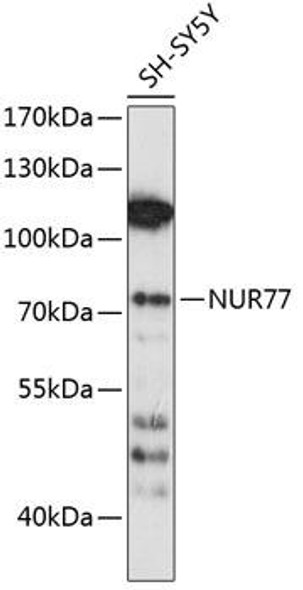Description
Anti-SLPI Antibody (CAB1897)
The SLPI Polyclonal Antibody (CAB1897) is a valuable tool for researchers studying the secretory leukocyte protease inhibitor (SLPI) protein, known for its role in immune regulation and inflammatory response. Raised in rabbits, this antibody is highly specific and reactive with human samples, making it ideal for use in Western blot applications for the detection and analysis of SLPI.SLPI is a crucial player in immune regulation, functioning as a protease inhibitor and anti-inflammatory molecule. It is involved in maintaining immune homeostasis and has been implicated in various diseases, including cancer, autoimmune disorders, and inflammatory conditions.
Understanding the role of SLPI in these pathological processes is essential for developing targeted therapies and treatment strategies.With the SLPI Polyclonal Antibody, researchers can accurately study and analyze the expression and function of SLPI in various cell types, advancing our understanding of its involvement in immune modulation and disease progression. This antibody is a valuable tool for immunology and cancer research, offering insights into new therapeutic approaches for conditions influenced by SLPI activity.
| Antibody Name: | Anti-SLPI Antibody |
| Antibody SKU: | CAB1897 |
| Antibody Size: | 20uL, 50uL, 100uL |
| Application: | WB |
| Reactivity: | Human |
| Host Species: | Rabbit |
| Immunogen: | Recombinant fusion protein containing a sequence corresponding to amino acids 26-132 of human SLPI (NP_003055.1). |
| Application: | WB |
| Recommended Dilution: | WB 1:500 - 1:2000 |
| Reactivity: | Human |
| Positive Samples: |
| Immunogen: | Recombinant fusion protein containing a sequence corresponding to amino acids 26-132 of human SLPI (NP_003055.1). |
| Purification Method: | Affinity purification |
| Storage Buffer: | Store at -20'C. Avoid freeze / thaw cycles. Buffer: PBS with 0.02% sodium azide, 50% glycerol, pH7.3. |
| Isotype: | IgG |
| Sequence: | SGKS FKAG VCPP KKSA QCLR YKKP ECQS DWQC PGKK RCCP DTCG IKCL DPVD TPNP TRRK PGKC PVTY GQCL MLNP PNFC EMDG QCKR DLKC CMGM CGKS CVSP VKA |
| Gene ID: | 6590 |
| Uniprot: | P03973 |
| Cellular Location: | Secreted |
| Calculated MW: | 14kDa |
| Observed MW: | Refer to Figures |
| Synonyms: | SLPI, ALK1, ALP, BLPI, HUSI, HUSI-I, MPI, WAP4, WFDC4 |
| Background: | This gene encodes a secreted inhibitor which protects epithelial tissues from serine proteases. It is found in various secretions including seminal plasma, cervical mucus, and bronchial secretions, and has affinity for trypsin, leukocyte elastase, and cathepsin G. Its inhibitory effect contributes to the immune response by protecting epithelial surfaces from attack by endogenous proteolytic enzymes. This antimicrobial protein has antibacterial, antifungal and antiviral activity. |
| UniProt Protein Function: | SLPI: Acid-stable proteinase inhibitor with strong affinities for trypsin, chymotrypsin, elastase, and cathepsin G. May prevent elastase-mediated damage to oral and possibly other mucosal tissues. |
| UniProt Protein Details: | Protein type:Secreted; Inhibitor; Secreted, signal peptide Chromosomal Location of Human Ortholog: 20q12 Cellular Component: extracellular matrix; extracellular space Molecular Function:endopeptidase inhibitor activity; enzyme binding; protein binding; serine-type endopeptidase inhibitor activity Biological Process: antibacterial humoral response; immune response; innate immune response; negative regulation of protein binding; negative regulation of viral genome replication; response to lipopolysaccharide |
| NCBI Summary: | This gene encodes a secreted inhibitor which protects epithelial tissues from serine proteases. It is found in various secretions including seminal plasma, cervical mucus, and bronchial secretions, and has affinity for trypsin, leukocyte elastase, and cathepsin G. Its inhibitory effect contributes to the immune response by protecting epithelial surfaces from attack by endogenous proteolytic enzymes. This antimicrobial protein has antibacterial, antifungal and antiviral activity. [provided by RefSeq, Nov 2014] |
| UniProt Code: | P03973 |
| NCBI GenInfo Identifier: | 113636 |
| NCBI Gene ID: | 6590 |
| NCBI Accession: | P03973.2 |
| UniProt Secondary Accession: | P03973,P07757, B2R5H8, |
| UniProt Related Accession: | P03973 |
| Molecular Weight: | 14,326 Da |
| NCBI Full Name: | Antileukoproteinase |
| NCBI Synonym Full Names: | secretory leukocyte peptidase inhibitor |
| NCBI Official Symbol: | SLPI |
| NCBI Official Synonym Symbols: | ALP; MPI; ALK1; BLPI; HUSI; WAP4; WFDC4; HUSI-I |
| NCBI Protein Information: | antileukoproteinase |
| UniProt Protein Name: | Antileukoproteinase |
| UniProt Synonym Protein Names: | BLPI; HUSI-1 |
| Protein Family: | Antileukoproteinase |
| UniProt Gene Name: | SLPI |
| UniProt Entry Name: | SLPI_HUMAN |







